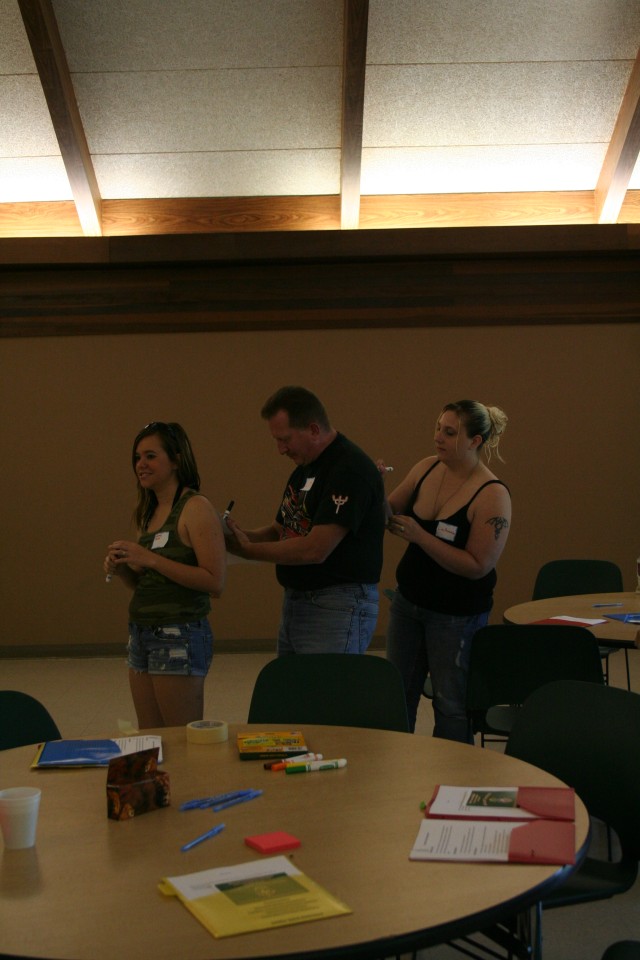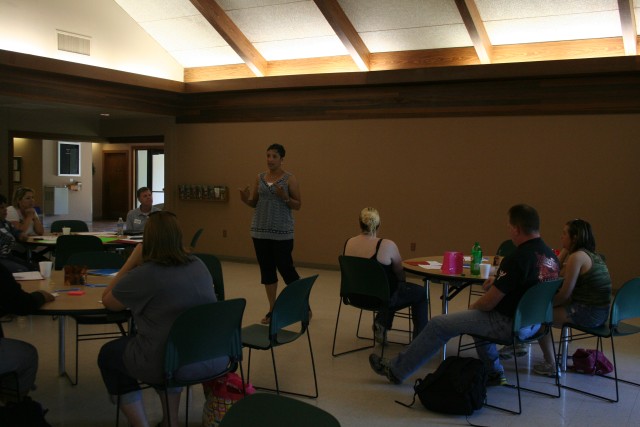FORT RILEY, Kan. - With 21 years of combined service in the Marines, Army Reserves and Army National Guard Lawrence "L.T." Russell never thought he'd be in the reversed role - watching his wife deploy.
Russell was one of eight spouses to take part in the Spouse Retreat June 25 at Rock Springs Ranch for spouses of Warrior Transition Battalion Soldiers.
"I'm one of the only male spouses here and this has always been a strange role," Russell said. "I'm in my fourth year and it's weird, nothing in my life has prepared me for this. My military background helps because at least I know what the military is. I understand the rank structure; I knew going into this that my wife is going overseas."
His wife deployed nearly two years ago with the 601st Aviation Support Battalion, Combat Aviation Brigade, 1st Infantry Division as the battalion chaplain.
"While they were over there the chaplain's assistant killed himself and that's working her really hard," Russell said. "She blames herself, all of that."
Russell learned of the retreat when picking his wife up from the WTB and saw the announcement for the event.
"(I'm) Looking to pick something up that can help," he said. "On the flip side too it shows the women it's not just them."
Alyse Bradley, another WTB spouse, knew her husband while in high school together but lost contact after he graduated.
"I was a sophomore, he was a junior so the year after he graduated we kind of lost touch. He joined the military and about a year later he found me on Facebook," she said. "We kind of started a long distance relationship, and in March we got married a couple weeks before he deployed."
The couple was going to put their marriage on hold but decided to go ahead and get married. In May, Bradley's husband was sent back to the U.S. after a previous back injury flared up.
"He had a previous back injury from (Advanced Individual Training), and it started getting really bad. He went to Germany and he was just supposed to go there for a couple of days for an MRI, and they got there and they sent him home," Bradley said.
When she received the unexpected call saying "Honey, I'm coming home" Bradley left her home in Idaho Falls, Idaho, and job as a developmental therapist working with special needs children to meet her husband in Kansas.
Due to the amount of stress she's been under the past month, Bradley decided she needed a little get away - so she attended the spouse retreat.
"It's just been kind of stressful with picking up and moving and adjusting from just starting to get myself comfortable with the idea 'OK he's deployed; he's in Afghanistan' and then all of a sudden - boom, he's back; he's home, and now I have to move and settle down again, and I don't have any friends or networking," she said. "So I decided I'd come out here and meet some people."
The first retreat of this nature was held in March at the WTB at Fort Carson, Colo.
"That one was successful, and through the medical command, Fort Riley was identified next to try to host a spouse retreat, take the spouses off site, give them a day of fun and enjoyment," said L'Tanya Pugh, manager, Outreach Programs, Soldier and Family Assistance Center.
"I think it's just wonderful that we have this opportunity," Bradley said. "I never thought that it would be anything like this. It's really a lot better than I expected."
The retreats began because MEDCOM wanted to assist Families and caregivers with being able to meet the challenges of caring for wounded and injured Soldiers. The retreat also gives them an opportunity for a day of education and awareness along with relaxation and fun.
"I am a military spouse, so I know that when your Soldier or your hero is injured or hurting that you hurt also and that you are often called upon, in fact, you take the role of the caregiver in your Soldier's absence," said Carol Brooks, wife of Maj. Gen. Vincent K. Brooks, 1st Infantry Division and Fort Riley commanding general. "Sometimes when your Soldier comes back ill or injured you become his caregiver as well. You take care of everybody often at the expense of yourselves, and I, as a military spouse, I can understand that and I appreciate you for that."
Breakout sessions were conducted for the spouses which included presentations from Dean Allen, military life consultant; Bryan Pyle, Business Training Solutions; Chap. Diana Crane, Irwin Army Community Hospital; Lt. Col. Leslie McAuliffe, WTB; and Erin Bishop, Kansas State University Research and Extension.
The afternoon was filled with low-to high-energy activities that the spouses could choose to participate in from archery to swimming or lounging by the pool.




Social Sharing